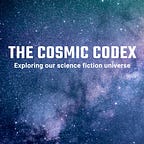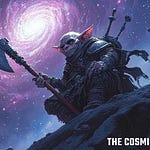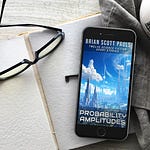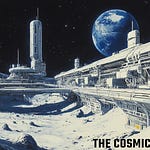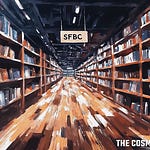by Brian Scott Pauls
In a century earlier than the 20th, Philip K. Dick might have been called a mystic. A brilliant author for whom only science fiction provided a broad enough canvas to encompass his themes, Dick struggled with drug addiction and mental illness for much of his relatively brief life. As is the sad case with many gifted artists, his misfortune was our gain. Out of his unique but tortured mind, Dick produced some of the strangest and most thought-provoking sf. His novels and short stories are filled with themes of paranoia, personal identity, alternate universes, the nature of reality, and speculative theology.
In February 1974, perhaps because of the drug sodium pentothal, which he received for a dental procedure, Dick started having a series of visions which lasted into March. He described them to fellow science fiction author Charles Platt:
"I experienced an invasion of my mind by a transcendentally rational mind, as if I had been insane all my life and suddenly I had become sane."
In 1976, based on these visions, Dick wrote a then-unpublished novel, later released posthumously (in 1985) as Radio Free Albemuth. Between 1978 and 1982, he reworked this material into the VALIS trilogy, beginning with the eponymously titled VALIS, about “…Dick’s gnostic vision of God.”
In the 1970s and 1980s, Dick’s speculations were often written off as the eccentricities of an addled brain. But were they any stranger than those experienced by Julian of Norwich or Teresa of Ávila? The Middle Ages had their anchoresses and nuns; we have our drug addicts and mental patients. Perhaps every age gets the mystics we deserve.
Each year, the Philadelphia Science Fiction Society and the Philip K. Dick Trust give out the Philip K. Dick Award “…for distinguished science fiction published in paperback original form in the United States during the previous calendar year.”
Candidates for this year’s award touch on a variety of “phildickian” themes, including a United States where the government provides every American with a Universal Basic Income, a virtual reality Internet so immersive some people can't find their way back, and an alternate history of World War II where Britain falls before the might of the Third Reich.
Here’s a bit about each of this year’s nominees:
Arboreality by Rebecca Campbell
Campbell expands her Sturgeon Award-winning short story “An Important Failure” into a novella about ordinary people battling climate change in small ways on the West Coast of North America.
Widowland by C. J. Carey
Carey’s alternate history dystopia uses a feminist lens to examine what might have happened if England had fallen to Germany during World War II.
Ymir by Rich Larson
Using Beowulf as a touchstone, Larson crafts the action-filled story of a reluctant protagonist returning to his frozen home world to grapple with a deadly threat, an uprising in progress, and unfinished business with a brother who once drove him away.
January Fifteenth by Rachel Swirsky
In the near future, every American receives their full Universal Basic Income on January 15. Swirsky’s novella explores how four characters from a variety of backgrounds respond to this annual event based on their very different personal, social, and economic circumstances.
The Legacy of Molly Southbourne by Tade Thompson
The climactic volume of the Molly Southbourne Trilogy, this novella follows Molly’s remaining duplicates, who have joined forces to protect one another as they seek to leave the past behind. Regrettably, those responsible for their troubled existence aren’t finished with them yet.
The Extractionist by Kimberly Unger
When virtual reality has become so sophisticated users can get lost in it, Eliza McKay is the savvy hacker who can rescue them. But what happens if her target doesn’t want to be rescued? Unger gives us a high-tech cyberpunk thrill ride about the machinations of a wealthy and powerful elite—and the woman who gets caught in the middle.
The 2023 winner of the Philip K. Dick Award will be announced at Norwescon 45 in Seattle on Friday, April 7.
Please share your thoughts about this article by commenting online at thecosmiccodex.com!


